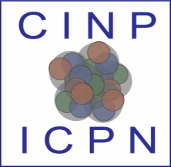Post-doc position at the University of New Hampshire
The Nuclear and Particle Physics Group at the University of New Hampshire has an immediate opening for a post-doctoral research associate, who will be expected to take a leading role in the Heavy Photon Search (HPS) experiment at Jefferson Lab, Hall B.
The HPS is a current experiment designed to look for a new, heavy, gauge boson (the heavy photon, or dark photon) in the mass range 20-1000 MeV that couples to electrons through kinetic mixing with couplings in the range 10-5 to 10-10. The HPS will search for the e+e- decay of the heavy photon, possibly with a displaced vertex, using a new compact forward spectrometer. This experiment will also search for true-muonium, a bound state that has not previously been observed. The collaboration is currently upgrading the detector, and is scheduled for a 9 week long run in the summer of 2019.
The successful candidate will have a PhD in nuclear or particle physics and will be expected to strongly contribute to the ongoing program, but is also encouraged to propose and initiate new experiments. Strong skills in data analysis and software development will be a plus. Depending on preference, the position can be located at UNH or at JLab.
The group's efforts are supported by the US Department of Energy. The University of New Hampshire is an equal opportunity employer. Candidates of both genders and all ethniticities are strongly urged to apply. The position is available immediately and will remain open until filled.
Applicants should send a resume (CV) and a summary of relevant experience/research plan, as well as arrange for 3 letters of recommendation to be send, to Maurik.Holtrop@unh.edu. Inquiries may be sent to the same address. The UNH NPGs efforts are supported by the US Department of Energy under grant DE-FG02-88ER4041.
The University of New Hampshire is an Equal Opportunity/Equal Access/Affirmative Action institution and all qualified applicants will receive consideration for employment without regard to sex, race, color, religion, age, national origin, sexual orientation, gender identity or expression, veterans status, physical or mental disability, or marital status. Candidates of all genders and under-represented groups are strongly encouraged to apply.
